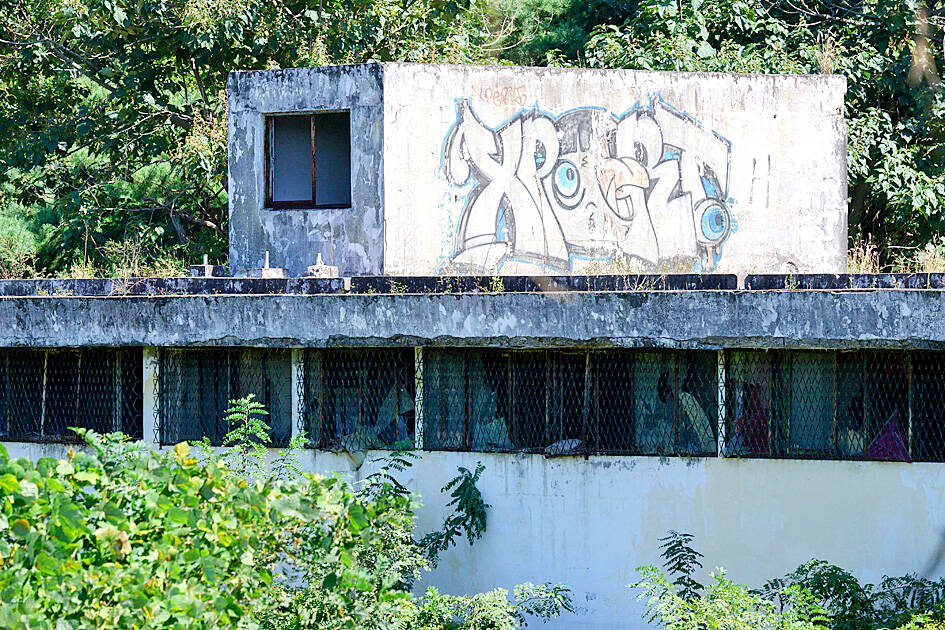Slated for demolition, the graffiti-covered building close to the inter-Korean border was once a “monkey house,” a clinic for sex workers forced to serve US soldiers protecting Seoul from North Korea.
Activists, including women who were forced into gruesome treatments for sexually transmitted diseases (STDs), say the site should be preserved for its historical significance, but the bulldozers are to move in this month to clear it for a tourist development.
The fight over the building in the lush forest of Dongducheon is illustrative of the broader struggle for recognition faced by South Korean women who say they were tricked or forced to work in state-run brothels serving US troops.

Photo: AFP
Unlike the better-known “comfort women” used by Japanese soldiers until the end of World War II, the tens of thousands of victims of state-sanctioned brothels run from the 1950s to 1980s by the South Korean government have received relatively limited attention.
“It was nicknamed the ‘monkey house’ because the women were kept confined like monkeys,” said Choi Hei-shin, a peace advocate and researcher.
Many women in the brothels, which the South Korean Supreme Court ruled were illegally “established, managed, and operated” by the state for US troops, were forced to undergo treatments for STDs against their will to protect their clients’ health.
Kim Un-hui was dragged to the monkey house in Dongducheon in the late 1970s when she was caught by authorities without an STD certificate and forcefully injected with an excessive amount of penicillin.
It was so painful it felt like someone was “stabbing me over and over again,” said Kim, now aged 66.
At that point, Kim was not even working in the military brothels, as she had married a US GI. Even so, she says she was detained and forced to share a cramped room with 20 other women.
One woman passed out from the penicillin injection and injured herself by hitting herself against the frame of a bed while unconscious, she said.
Medical staff “just stood there and did nothing,” Kim said, adding that the experience still haunted her.
A historic 2022 Supreme Court ruling found the South Korean government had illegally been “justifying and promoting prostitution” among its female citizens, causing “loss of human dignity” and “mental suffering.”
Kim said she responded to an advert looking for a waitress, but was trafficked by a South Korean pimp into a military brothel. She considers herself lucky as she quickly met her husband, one of her first customers, and escaped with him.
Many other women died from the drugs handed out by pimps or from the consequences of the botched medical treatments offered in the monkey houses, according to survivors and historians.
“The authorities administered over 10 times the safe amount of penicillin to the victims,” said Kim Eun-jin, director of Durebang, a group of activists supporting the survivors.
Some survivors have received small payouts from the South Korean state, but efforts to get the US, which still has tens of thousands of troops stationed in South Korea, to acknowledge its role and apologize have so far been fruitless.
“We have witnessed our colleagues die from illnesses, suicides and crimes,” 73 South Korean survivors wrote in a letter to then-US president Barack Obama in 2009.
“The US military authorities in South Korea intervened directly in the prostitution surrounding military bases for the ‘health and comfort of the US troops’... This was a clear state crime.”
About 6km from the monkey house lies a cemetery where up to 70 percent of the graves are likely former sex workers from US military camps, activists said.
They are now being relocated to transform the area into a park.
When reporters visited, most graves were unmarked and completely overgrown with thick weeds. A lone excavator was already relocating remains.
Signs posted at each indistinguishable grave site asked any surviving relatives to get in touch.
Due to shame, many women in the brothels were cut off from their families and kept their identities secret, which explains why “they were buried even without names,” Choi said.
However, the economy surrounding military brothels in US camp-towns, including restaurants, barbershops and bars catering to GIs, made up about 25 percent of South Korea’s GDP during the 1960s and 1970s.
The state “profited from their bodies, using them merely as tools,” Choi said.
The building is in poor repair: video showed the interior covered with disturbing graffiti including a face weeping blood, and local authorities say it is now too late to cancel the demolition, but Kim Un-hui says it should be preserved as a way to give her and her colleagues recognition for their suffering.
“We were abused by our own country,” she said. “They’re trying to erase [our story] from history.”

ANGER: A video shared online showed residents in a neighborhood confronting the national security minister, attempting to drag her toward floodwaters Argentina’s port city of Bahia Blanca has been “destroyed” after being pummeled by a year’s worth of rain in a matter of hours, killing 13 and driving hundreds from their homes, authorities said on Saturday. Two young girls — reportedly aged four and one — were missing after possibly being swept away by floodwaters in the wake of Friday’s storm. The deluge left hospital rooms underwater, turned neighborhoods into islands and cut electricity to swaths of the city. Argentine Minister of National Security Patricia Bullrich said Bahia Blanca was “destroyed.” The death toll rose to 13 on Saturday, up from 10 on Friday, authorities

DEBT BREAK: Friedrich Merz has vowed to do ‘whatever it takes’ to free up more money for defense and infrastructure at a time of growing geopolitical uncertainty Germany’s likely next leader Friedrich Merz was set yesterday to defend his unprecedented plans to massively ramp up defense and infrastructure spending in the Bundestag as lawmakers begin debating the proposals. Merz unveiled the plans last week, vowing his center-right Christian Democratic Union (CDU)/Christian Social Union (CSU) bloc and the center-left Social Democratic Party (SPD) — in talks to form a coalition after last month’s elections — would quickly push them through before the end of the current legislature. Fraying Europe-US ties under US President Donald Trump have fueled calls for Germany, long dependent on the US security umbrella, to quickly

Local officials from Russia’s ruling party have caused controversy by presenting mothers of soldiers killed in Ukraine with gifts of meat grinders, an appliance widely used to describe Russia’s brutal tactics on the front line. The United Russia party in the northern Murmansk region posted photographs on social media showing officials smiling as they visited bereaved mothers with gifts of flowers and boxed meat grinders for International Women’s Day on Saturday, which is widely celebrated in Russia. The post included a message thanking the “dear moms” for their “strength of spirit and the love you put into bringing up your sons.” It

In front of a secluded temple in southwestern China, Duan Ruru skillfully executes a series of chops and strikes, practicing kung fu techniques she has spent a decade mastering. Chinese martial arts have long been considered a male-dominated sphere, but a cohort of Generation Z women like Duan is challenging that assumption and generating publicity for their particular school of kung fu. “Since I was little, I’ve had a love for martial arts... I thought that girls learning martial arts was super swaggy,” Duan, 23, said. The ancient Emei school where she trains in the mountains of China’s Sichuan Province